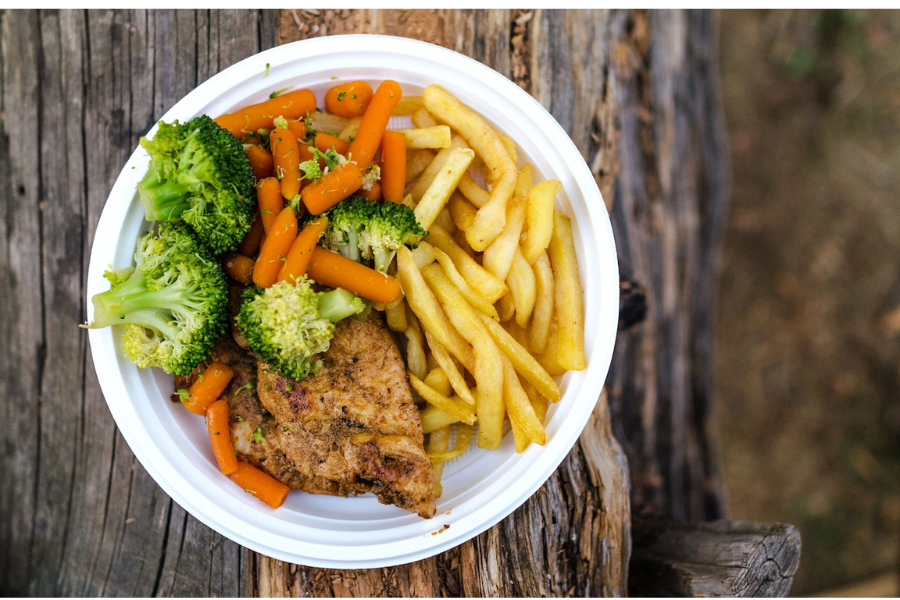
Why is eating maintenance calories important in a fitness plan? Your body does not want you to be in a calorie deficit all year around. Its not conductive for training performance and hormonal health to be always in a deficit.
Contrarily, your body does not want you in a caloric surplus all year around either. It’s not optimal for maintaining leanness and relative strength.
There should be a planned period in the year where you work on maintaining your current weight and body fat levels.
Periods of maintaining your weight are going to become more important as you work your way to your goal body-weight.
This post is all about mastering eating maintenance calories for long-term fitness. We will discuss the training and lifestyle benefits of a maintenance phase.
What Eating to Maintain Your Body-weight Actually Means
Eating to maintain your body weight is mostly about maintaining a lifestyle. All the great habits you built during your fat loss phase should remain the same. The only difference is you have more calories to play with.
For example, if you were initially 165lbs and you diet down to 150 lbs, you would eat the calories it takes to maintain 1501bs. An extra few hundred calories a day may seem like a lot, but it’s not.
Many people typically eat at a 500-800 calorie deficit to lose a pound to a pound-in-a half of fat per week.
At maintenance, an extra 500-800 calories may allow you to add a couple snacks or another small meal to your diet. It’s not a significant caloric increase.
Eating Maintenance Calories to Lose Weight
Weight loss plateaus are going to happen. Even if you are very consistent with your caloric deficit and eating the same meals all the time, your fat loss will eventually plateau.
You may have successfully cut from 200 pounds down to 170 pounds and you noticed you’re not losing anymore weight. The body-weight you want to be is 150, but you can’t break pass 170.
In this case, a planned period of eating more and maintaining 170 lbs. would be necessary for your long-term fat loss goals. This would help bring up your satiety hormone leptin and combat metabolic adaptation.
If you want to learn more about hormones, check out this article 7 Hormones You Must Manage on a Weight Loss Program.
Eating Maintenance Calories and Working Out

Training performance improves significantly when you bring your calories up to maintenance. You find it easier to improve 5-rep max strength on compound exercises such as:
- Bench Press
- Over Head Press
- Weighted chin-ups
- Squats
- Deadlifts
When you’re in a caloric deficit for prolonged periods of time, training performance starts to decline a bit. It becomes harder to hit personal records every lifting session as your body-weight and body fat percentage goes down.
Macro-nutrient Intake at Maintenance
The primary macro-nutrient you want to get when eating at maintenance is carbohydrates. Protein and fat intake should remain the same, but calories from carbohydrates should increase significantly.
Carbs will fuel training and better support leptin levels during a maintenance period.
Since carbohydrates are muscle-protein sparing, you don’t have to consume a lot of protein at maintenance.
If you want to learn more about carbs, check out this article Why Carbohydrates are Important for Fat Loss
Eating Maintenance Calories Once a Week
Once a week, eating at maintenance can be beneficial depending on factors such as
- Body fat percentage
- Calorie deficit size
In fitness culture, we have something known as the weekly refeed. This is where you have 1 day out of the week where you are eating at caloric maintenance and eating more carbs to bring up leptin levels.
The other 6 days you are in a deficit.
This is not the same thing as a full out cheat day. Many people in fitness use the weekly refeed as a way of avoiding a decline in metabolism due to cutting.
The truth is a decline in metabolism is unavoidable depending on how much weight you lose.
For example, if you cut from 200 lbs down 170 Ibs, you are not going to have the luxury of eating the same amount of food at 170 that you were eating at 200.
You are carrying around 30 pounds less weight. Therefore, your body will require less food energy to sustain that new weight.
Body Fat Percentage
Men who are below 13% body fat and want to get leaner can benefit from refeeding once a week.
Women who are below 18% body fat and want to get leaner can also benefit from refeeding once a week.
The leaner you get, the harder it becomes for your body to sustain an energy deficit. This is because we are designed for survival.
When fat storage gets too low, your body wants to slow down your metabolic rate to keep you alive. Your body thinks you are literally starving to death.
Worst case scenario, your body starts to eat away muscle when body fat gets too low. This is not something you want.
Refeeding once a week allows your body to replenish muscle glycogen and bring up leptin by eating more calories especially from carbohydrates.
Calorie Deficit Size
If you are in a large caloric deficit daily, then it can be advantageous to have a maintenance day once a week. You might be someone on an aggressive fat loss program because you have significantly more fat to lose.
You may be eating in an 800-calorie deficit every day to lose 1 -2 pounds of fat per week. In this case, a weekly maintenance day can
- Benefit your hormones.
- Prevent a significant decline in training performance.
- Make your muscles look fuller.
- Improve your sleep quality.
You would be surprised how much of your muscle building resources you can regain with the weekly refeed.
Eating Maintenance Calories but Gaining Weight
It is possible to gain weight after prolonged period of eating at maintenance. However, the weight gain is not body fat. The weight gain can be a mixture of things including:
- Water Retention
- Muscle Glycogen
- Lean Muscle Mass
You may find the scale slowly goes up 3-5 pounds, but it’s not going to keep going up. The best thing you can do is continue to take body fat test during your maintenance phase.
If the scale is going up too quickly, you’re most likely in a high caloric surplus. It is important to make sure calories are still accounted for even if you are maintaining.
As you progress in your workouts, and you smash personal records in the gym, your body weight may go up, but it’s going up in a very lean way.
Eating Maintenance Calories and Intermittent Fasting
Even if you are just trying to maintain your weight, you should continue to practice intermittent fasting. People typically view intermittent fasting as a weight loss tool, but it should really be viewed as a lifestyle tool.
Fasting has benefits that goes beyond just weight loss or weight management. People fast as a preventive for:
- Type 2 Diabetes
- Cancer
- Cognitive Disorders
Intermittent fasting is more fun on a maintenance plan compared to a fat loss plan. Satiety is better optimized, and you get better nutrient partitioning.
Satiety is not perfectly optimized when you are eating in a deficit and doing intermittent fasting.
Even if you are eating big high-protein meals and fitting in dessert at night, you may still have days where you feel a little hungry.
Unfortunately, this is the nature of a fat loss program. Some days it’s easy to be in a calorie deficit. Some days are harder.
If you want to learn more about the amazing benefits of fasting, check out this article How Intermittent Fasting Can Save Your Life.
Daily Activity for Weight Maintenance

The daily activity you been doing during your fat loss period should remain the same at maintenance. The reason being, we are optimizing for lifestyle and long-term fat loss.
NEAT has been shown to go up when you eat more food. NEAT stands for Non-Exercise Activity Thermogenesis.
This is the reason why some people lose a little bit of fat weight during a maintenance phase. With the extra food content in the stomach, you will have a desire to be up moving around more to not feel tired or lazy.
If you want to learn more about increasing your NEAT, refer to this article 3 Ways Your Body Burns Calories in a Day.
The best exercise you can do to increase your NEAT is walk. If you developed a habit of getting 7,000+ steps in everyday during your fat loss program, you want to continue that habit during your maintenance program.
If you want to learn more about what walking can do for you, check out this article Why Walking is the Best Exercise for Long-Term Fat Loss.
Eating at Maintenance Improves Sleep
Sleep quality will improve greatly during a maintenance phase. Being in a caloric deficit, especially a big one, can negatively affect your sleep at some point.
Even if you go to bed not hungry and your leptin is elevated, you still may not want to fall asleep because not enough serotonin was released in your brain. Serotonin is a neurotransmitter that helps you feel relaxed and sleepy.
When you eat more calories, mainly carbohydrates, you promote the release of serotonin and fall asleep easily.
How Long Should You Eat at Maintenance before Resuming at a Cut?
There is no straightforward easy answer to this question. It depends on a few different factors.
How Long Were You Running a Calorie Deficit for?
If you spent 3-4 months aggressively cutting fat with very little refeed days in between, then it’s recommended to eat at maintenance for at least 1-3 months before continuing to work your way to your goal body weight.
Embrace the new body weight and body fat percentage you achieved and just stay there for a little while.
It is also important to make sure you know what your new maintenance calories are based on the current body weight you achieved.
How Well Did You adhere to Your Diet?
You may have had several days where you screwed up your diet, overate, and didn’t see much progress in the way of fat loss. You might not be mentally ready to be on a fat loss diet.
In this situation, you would want to spend 2-4 weeks eating at your maintenance calories.
This will do a few things for you:
- It will give you time to properly structure your meals and determine what meals make dieting easy for you.
- It will eliminate yo-yo dieting, which is having calories up 1 day, down the next day, and then up again the next day.
- It will give your metabolism time to stabilize.
Conclusion
Weight management is one of the most overlooked skills in fitness. There is not enough education about mastering maintaining weight. When you master the skill of maintaining leanness, you will eventually get to a point where you no longer must track calories.
